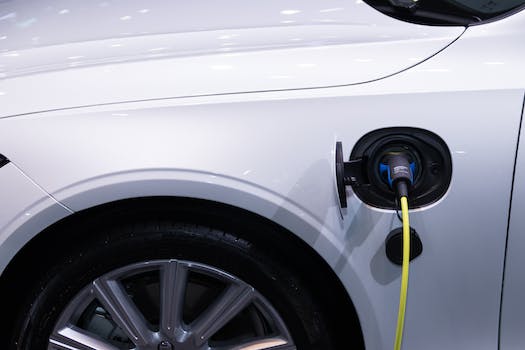
Understanding Hybrid Cars: Benefits and Technology Explained
-
Table of Contents
- Introduction
- Exploring the Pros and Cons of Hybrid vs. Plug-in Hybrid Cars
- Comparing the Cost of Ownership for Hybrid vs. Plug-in Hybrid Cars
- Examining the Environmental Impact of Hybrid vs. Plug-in Hybrid Cars
- Analyzing the Performance of Hybrid vs. Plug-in Hybrid Cars
- Investigating the Maintenance Requirements of Hybrid vs. Plug-in Hybrid Cars
- Q&A
- Conclusion
“Discover the Difference: Compare Hybrid vs. Plug-in Hybrid Cars to Find the Right Fit for You!”
Introduction
Hybrid and plug-in hybrid cars are becoming increasingly popular as more people look for ways to reduce their carbon footprint and save money on fuel costs. But which type of car is right for you? In this article, we will compare hybrid and plug-in hybrid cars to help you decide which one is the best fit for your lifestyle and budget. We will look at the differences between the two types of cars, the pros and cons of each, and the cost of ownership. By the end of this article, you should have a better understanding of which type of car is right for you.
Exploring the Pros and Cons of Hybrid vs. Plug-in Hybrid Cars
Hybrid and plug-in hybrid cars are becoming increasingly popular as more drivers look for ways to reduce their carbon footprint and save money on fuel costs. But which type of car is right for you? In this blog post, we’ll explore the pros and cons of hybrid vs. plug-in hybrid cars to help you make an informed decision.
Pros of Hybrid Cars
Hybrid cars are powered by both a gasoline engine and an electric motor, which makes them more fuel-efficient than traditional gasoline-powered cars. They also produce fewer emissions, making them a great choice for eco-conscious drivers. Additionally, hybrid cars are typically more affordable than plug-in hybrids, making them a great option for budget-conscious drivers.
Cons of Hybrid Cars
The main downside of hybrid cars is that they don’t have as much range as plug-in hybrids. This means that you’ll need to refuel more often if you’re taking long trips. Additionally, hybrid cars don’t have as much power as plug-in hybrids, so they may not be the best choice for drivers who want a powerful car.
Pros of Plug-in Hybrid Cars
Plug-in hybrid cars are powered by both a gasoline engine and an electric motor, just like hybrid cars. However, they also have a larger battery that can be recharged from an external power source. This means that plug-in hybrids have a much longer range than hybrid cars, making them a great choice for drivers who take long trips. Additionally, plug-in hybrids have more power than hybrid cars, so they’re a great choice for drivers who want a powerful car.
Cons of Plug-in Hybrid Cars
The main downside of plug-in hybrids is that they’re more expensive than hybrid cars. Additionally, they require access to an external power source in order to recharge the battery, which may not be available in some areas. Finally, plug-in hybrids may not be as fuel-efficient as hybrid cars, depending on how often you recharge the battery.
Conclusion
Hybrid and plug-in hybrid cars both have their advantages and disadvantages. Ultimately, the best choice for you will depend on your budget, driving habits, and access to an external power source. If you’re looking for a more affordable and fuel-efficient car, a hybrid may be the best choice. However, if you take long trips or want a powerful car, a plug-in hybrid may be the better option.
Comparing the Cost of Ownership for Hybrid vs. Plug-in Hybrid Cars
When it comes to choosing a car, the cost of ownership is an important factor to consider. Hybrid and plug-in hybrid cars are two popular options for those looking to save money on fuel costs. But which one is the better option when it comes to cost of ownership? Let’s take a look.
The cost of a hybrid car is typically lower than that of a plug-in hybrid car. This is because the battery in a hybrid car is smaller and less expensive than the battery in a plug-in hybrid car. Additionally, hybrid cars are more fuel-efficient than plug-in hybrids, so you’ll save money on fuel costs over time.
However, the cost of ownership for a plug-in hybrid car is often lower than that of a hybrid car in the long run. This is because plug-in hybrids have larger batteries that can be recharged with electricity, which is usually cheaper than gasoline. Additionally, plug-in hybrids are eligible for government incentives, such as tax credits, which can help offset the cost of ownership.
When it comes to cost of ownership, both hybrid and plug-in hybrid cars can be good options. The best choice for you will depend on your budget and driving habits. If you’re looking for a more affordable option, a hybrid car may be the better choice. However, if you’re looking for a car that will save you money on fuel costs in the long run, a plug-in hybrid may be the better option.
Examining the Environmental Impact of Hybrid vs. Plug-in Hybrid Cars

The debate between hybrid and plug-in hybrid cars has been ongoing for some time now. While both types of vehicles offer a number of benefits, it’s important to consider the environmental impact of each. In this blog post, we’ll take a look at the environmental impact of hybrid and plug-in hybrid cars.
Hybrid cars are powered by a combination of a gasoline engine and an electric motor. The electric motor is powered by a battery, which is recharged by the gasoline engine. This type of vehicle is more fuel-efficient than traditional gasoline-powered cars, as it uses less fuel and produces fewer emissions.
Plug-in hybrid cars are similar to hybrid cars, but they have a larger battery that can be recharged by plugging it into an electrical outlet. This allows the car to run solely on electricity for a certain distance before the gasoline engine kicks in. This type of vehicle is even more fuel-efficient than a hybrid car, as it uses less fuel and produces fewer emissions.
When it comes to the environmental impact of hybrid and plug-in hybrid cars, both types of vehicles offer a number of benefits. Hybrid cars produce fewer emissions than traditional gasoline-powered cars, while plug-in hybrid cars produce even fewer emissions. Additionally, both types of vehicles are more fuel-efficient than traditional gasoline-powered cars, which helps to reduce fuel consumption and save money.
Ultimately, both hybrid and plug-in hybrid cars offer a number of environmental benefits. While both types of vehicles are more fuel-efficient and produce fewer emissions than traditional gasoline-powered cars, plug-in hybrid cars offer even greater fuel efficiency and emissions reductions. Therefore, if you’re looking for a vehicle that is both fuel-efficient and environmentally friendly, a plug-in hybrid car may be the best option for you.
Analyzing the Performance of Hybrid vs. Plug-in Hybrid Cars
Hybrid and plug-in hybrid cars are becoming increasingly popular as more drivers look for ways to reduce their carbon footprint and save money on fuel costs. But which type of car is the better choice? In this blog post, we’ll take a look at the performance of hybrid and plug-in hybrid cars to help you decide which one is right for you.
When it comes to fuel efficiency, hybrid cars are the clear winner. Hybrid cars use a combination of gasoline and electric power to run, which means they can get up to 50 miles per gallon (MPG) in city driving and up to 60 MPG on the highway. Plug-in hybrids, on the other hand, are powered by a combination of gasoline and electric power, but they also have a larger battery that can be recharged from an external power source. This means they can get up to 100 MPG in city driving and up to 120 MPG on the highway.
When it comes to acceleration, plug-in hybrids have the edge. Plug-in hybrids have a larger battery and electric motor, which means they can accelerate faster than hybrid cars. Hybrid cars, on the other hand, rely on their gasoline engine to provide the power needed for acceleration, which can be slower than a plug-in hybrid.
Finally, when it comes to cost, hybrid cars are usually the more affordable option. Hybrid cars typically cost less than plug-in hybrids, and they also require less maintenance since they don’t have a large battery that needs to be recharged. Plug-in hybrids, on the other hand, require more maintenance since they have a larger battery that needs to be recharged regularly.
Overall, both hybrid and plug-in hybrid cars offer great performance and fuel efficiency. The choice between the two ultimately comes down to your budget and driving needs. If you’re looking for a car that’s more affordable and requires less maintenance, then a hybrid car may be the right choice for you. If you’re looking for a car that offers faster acceleration and higher fuel efficiency, then a plug-in hybrid may be the better option.
Investigating the Maintenance Requirements of Hybrid vs. Plug-in Hybrid Cars
Hybrid and plug-in hybrid cars are becoming increasingly popular as more drivers look for ways to reduce their environmental impact and save money on fuel costs. But what are the differences between these two types of cars, and what are the maintenance requirements for each? In this blog post, we’ll explore the differences between hybrid and plug-in hybrid cars and discuss the maintenance requirements for each.
Hybrid cars are powered by both a gasoline engine and an electric motor. The electric motor is powered by a battery that is recharged by the gasoline engine and regenerative braking. Hybrid cars are designed to be more fuel-efficient than traditional gasoline-powered cars, and they typically have lower emissions.
Plug-in hybrid cars are similar to hybrid cars, but they have a larger battery that can be recharged by plugging into an external power source. This allows the car to run solely on electric power for a certain distance before the gasoline engine kicks in. Plug-in hybrids are even more fuel-efficient than hybrid cars, and they have even lower emissions.
When it comes to maintenance, hybrid and plug-in hybrid cars have similar requirements. Both types of cars require regular oil changes, tire rotations, and brake inspections. Additionally, the batteries in hybrid and plug-in hybrid cars need to be checked periodically to ensure they are functioning properly.
The main difference between hybrid and plug-in hybrid cars is the cost of maintenance. Hybrid cars typically require less maintenance than plug-in hybrids because they don’t have a larger battery that needs to be recharged. Plug-in hybrids require more frequent maintenance because of the larger battery and the need to recharge it.
Overall, hybrid and plug-in hybrid cars are both great options for drivers looking to reduce their environmental impact and save money on fuel costs. While both types of cars require regular maintenance, plug-in hybrids require more frequent maintenance due to the larger battery and the need to recharge it.
Q&A
Q1: What are the main differences between hybrid and plug-in hybrid cars?
A1: The main difference between hybrid and plug-in hybrid cars is that plug-in hybrids have larger batteries that can be recharged from an external power source, such as a wall outlet, while hybrids rely solely on their internal combustion engine and regenerative braking to recharge their batteries. Plug-in hybrids also have the ability to travel longer distances on electric power alone.
Q2: What are the advantages of owning a hybrid car?
A2: The main advantages of owning a hybrid car are improved fuel economy, lower emissions, and reduced maintenance costs. Hybrid cars also tend to be more reliable than their gasoline-powered counterparts.
Q3: What are the advantages of owning a plug-in hybrid car?
A3: The main advantages of owning a plug-in hybrid car are the ability to travel longer distances on electric power alone, improved fuel economy, lower emissions, and reduced maintenance costs. Additionally, plug-in hybrids can be recharged from an external power source, such as a wall outlet, making them more convenient to use.
Q4: What are the disadvantages of owning a hybrid car?
A4: The main disadvantages of owning a hybrid car are higher initial costs, limited range on electric power alone, and the need to recharge the battery regularly. Additionally, hybrid cars tend to be heavier than their gasoline-powered counterparts, which can affect performance.
Q5: What are the disadvantages of owning a plug-in hybrid car?
A5: The main disadvantages of owning a plug-in hybrid car are higher initial costs, limited range on electric power alone, and the need to recharge the battery regularly. Additionally, plug-in hybrids require access to an external power source, such as a wall outlet, in order to recharge the battery.
Conclusion
In conclusion, hybrid and plug-in hybrid cars both offer a great way to reduce emissions and save money on fuel costs. Ultimately, the right choice for you depends on your lifestyle and budget. If you are looking for a car that can travel long distances without needing to be recharged, a hybrid car may be the best option. If you are looking for a car that can travel short distances and you have access to charging stations, a plug-in hybrid car may be the better choice.






